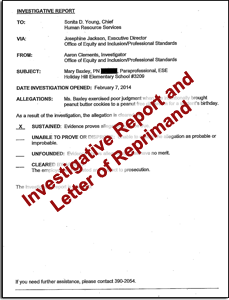The food allergy community was abuzz last week with the news that Mary Baxley, a paraprofessional at Holiday Hill Elementary School in Jacksonville, Florida, received a 10-day suspension for bringing peanut butter cookies to celebrate a student’s birthday in a peanut-free classroom. But what should parents of children with food allergies learn from the incident?
For those unfamiliar with the story, a girl in the class ingested one of the cookies and immediately suffered symptoms of anaphylaxis. She was subsequently injected with epinephrine by the school nurse, and rushed to the hospital where she fully recovered. Here is video from a recent news report from WAWS TV, a local Fox affiliate in Jacksonville.
 We obtained a copy of the investigative report on the matter issued by the Office of Equity and Inclusion, a copy of which you can find here along with the letter of reprimand for Mary Baxley. Both should be required reading for all parents and school staff concerned with food allergy management in the classroom.
We obtained a copy of the investigative report on the matter issued by the Office of Equity and Inclusion, a copy of which you can find here along with the letter of reprimand for Mary Baxley. Both should be required reading for all parents and school staff concerned with food allergy management in the classroom.
A few important items gleaned from the report:
- Baxley was reprimanded once before for an unrelated incident that sent a child to the emergency room. In November 2013, one of her students climbed out of the window of her classroom, and upon climbing back, knocked Venetian blinds down, cutting a fellow student’s ear.
- Baxley brought in the peanut butter cookies for a child in another classroom despite a clearly marked sign posted outside that classroom warning “Peanut-Free Classroom, please do not bring any peanuts or products containing peanuts into the classroom.”
- Baxley gave the cookies to Rochelle Pugh, another paraprofessional aide assigned to the classroom in question, and told her the cookies were safe. Pugh distributed the cookies late in the day.
- Judy Boucher, the teacher of the peanut-free class, was informed by Pugh that cookies were provided for a student’s birthday. After they were distributed, Boucher asked the children what the cookies tasted like. When one child replied “peanut butter”, Boucher immediately collected all the cookies, notified the school nurse, and wiped down all the desks.
- Earlier in the day, Stephanie Pritchett, the school nurse, was told that there were cookies for a birthday in the peanut-free classroom. Her initial reaction was to disallow the treats, but when she heard they were provided by Baxley (whom she assumed knew better), she relented.
The important inference we can draw from this incident was that it was the result of a systemic breakdown of the rules. Though Baxley was the one reprimanded, the others, including the teacher, aide, and school nurse, were also responsible for not intervening.
While we agree that this incident was particularly egregious, we see it as an opportunity to reflect on your own school’s policies. Here are our recommendations:
- First and foremost, a child with food allergies should NEVER be given a food unless it was approved by the parent! We advocate that such children be allowed to keep their own personal treat box in the classroom, stocked with individually wrapped treats by the parents;
- No impromptu celebrations involving food, EVER. All such celebrations must be planned in advance, signed off by both the principal and school nurse, and the parents of allergic children must be notified of the menu well in advance of the occasion and given a chance to veto any food item;
- Homemade/unwrapped/unlabeled treats should NEVER be allowed in the classroom;
- All treats should be checked against a pre-approved list and those that are not listed should NOT be allowed in the classroom. (Our Safe Snack Guide is a good resource.)
We urge you to print the above report, read it carefully, and distribute copies to your child’s principal, school nurse, teachers and aides and discuss the findings with them. Your vigilance will help ensure that a similar breakdown doesn’t occur in your child’s classroom!
- School worker suspended after student with allergy gets sick – WAWS TV
- Investigative Report of Mary Baxley, PN by Office of Equity and Inclusion – Cox Media Group






This story is very upsetting. I have a child who is allergic to peanuts in 2nd grade (as well as a baby who is also allergic). We live in a small town and I have great confidence in my son’s teacher and school nurse. I don’t think a blanket rule of only pre-packaged stuff is necessary and I would hate it if that were the case in my son’s class. I home make cupcakes for him to take in. I know what is in them, and I trust some of the other parents to do the same. That general rule is inappropriate in my opinion. I think whether home-made things are allowed should be decided by the individual schools and parents on a case by case basis.
We also need to be careful with foods that are “packaged in a peanut facility”. There is the remote chance of cross contamination. Many timesweneed to teach the parents this as well as our faculty
I feel for these parents. It is the most unsettling feeling, knowing that this could happen in a place that is supposed to put the child’s safety first. My child’s class actually has a snack brought in daily by an assigned student. My nut-allergic child’s teacher also has severe food allergies, so at first I had her reading the labels for my child. However, since I learned that cross contamination labeling is NOT required by law (such a shame!), I’ve taken some extra measures: I’ve posted a Snack Safely list by the door and cross check snacks myself (1 student per day bring in snacks for the entire class). It also really helps to have casual conversations with each parent in the class that mention my daughter’s allergies. I find it helps put food allergies on their radar when they have heard my daughter’s personal struggles. My thoughts are with this child, that this horrifying experience can be turned into a positive learning experience for her!
I agree that homemade foods should not be allowed for any kids. We are worried about allergens but food safety is also a potential issue with home made treats. We also have obese kids in this country. School needs to be more about learning and less about food in the classroom. Some schools are ditching all treats period & I think it’s a great idea.